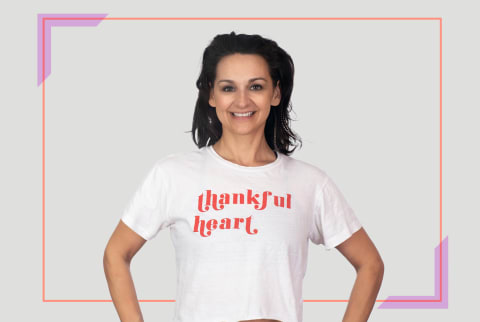Advertisement
I Was 44 & Healthy When I Had A Heart Attack: What The Experience Taught Me


I was teaching a cycling class on a Wednesday morning when I suddenly noticed something was off in my body. It was like a switch had been flipped—about 20 minutes into the class, I felt an immediate pressure and tightness in my chest. I got off my bike, but I could still breathe and communicate—so I tried not to overthink it, and chalked it up to indigestion.
I never considered this uncomfortable feeling could be life-threatening.
My symptoms were a sign of something much worse.
After teaching my morning classes at CycleBar, where I’ve been an instructor for years, I went home for the afternoon and took a nap. Then, I went back to the studio to teach my classes for the evening. Throughout the rest of the day, I continued to experience constant pressure in my chest.
The next morning, I didn’t have any pain. I just felt tired. I decided to take it easy for the next two days but then went back to teaching on Saturday. During my first class of the day, I felt an immediate explosion of pain in my chest, like someone had punched me. Then, I realized I couldn’t feel my arm or grip anything—it was completely numb and tingly.
At first, I thought maybe my blood sugar was low so I left the class to grab a snack. I barely made it a few steps into the hallway when I collapsed. I was shaking, freezing, and it was difficult to breathe. I couldn’t feel my body.
Fortunately, there were many people in the studio who saw what happened, and I was sent to the hospital immediately. Later, I learned I’d experienced a “widowmaker heart attack” which happens when you have a blockage in the left anterior descending (LAD) artery of the heart. In my case, it was 100% blocked.
Prior to this event, I never experienced any heart issues, and I didn’t have any precursors to a heart attack (hypertension, diabetes, etc.). I was 44, very active, and overall healthy. So it was easy to ignore or justify any discomfort I was feeling. However, if I’d gone to the doctor on Wednesday, when I first experienced symptoms, I wonder if it may have prevented this traumatic health experience.
Nevertheless, I’m so grateful to be alive, and I believe my active lifestyle was really training my body for when I needed it most.
After my heart attack, I spent a few days in cardiac intensive care so doctors could monitor my heart. When I was finally discharged from the hospital, I had to wear a vest that served as a portable defibrillator all day, every day, for the next six months. Because my heart attack was so severe, it significantly damaged my heart, and now I live with congestive heart failure.
The road to recovery made me stronger, physically and mentally.
While I wanted to jump back into my old life right away after my heart attack, I knew that the only way I was going to truly heal was to step back and rest. I remember getting so out of breath the first time I had to walk up the stairs that I began to cry in frustration, and I’ve had to practice a lot of patience with myself every day since.
It wasn’t easy to adjust so many aspects of my lifestyle. For instance, I wasn’t someone who took any medication before my heart attack, and now, my routine involves a whole pharmacy of pills. I also had to be patient with my body as I completed cardiac therapy sessions, which is basically physical therapy for your heart. I pushed through each stage, trying to find positivity and gratitude.
After taking six months off of teaching, I returned gradually, listening to my body through the whole process. In addition to teaching yoga and strength classes, I now stick to one cycling class a week, which feels safe for me and my body. Ultimately, after trusting the recovery process, I’m now back to doing all the things I love.
What I’ve learned through my health journey.
I believe my heart attack has been my biggest teacher.
While I can’t say for certain, I do believe that stress played a huge role in my heart attack—as a business owner in the fitness space, especially during a pandemic, I was under a lot of pressure and strain.
Through my journey, the biggest thing I've learned is to lean into rest and recovery for my body and mind. I’m intentional about my time, my work, and how I distribute my energy. No matter what, between 2-3 p.m. each day, I shut down and unwind.
What I learned during my six-month sabbatical post-attack is that I need that significant rest each year, and I have a responsibility to myself to prioritize it. For that reason, I’ve also committed to taking the entire month of May off from teaching. I’ve done this each year, since my heart attack three years ago.
Ultimately, I’ve embraced the idea that rest is just as important as the work you do.
What I want people to take away from my story.
It’s so important to know that anyone can have a heart attack—healthy individuals, women, anyone. I don’t say that to scare people, but rather to raise awareness. Frankly, I still can’t believe it happened to me—and it happened to me.
I also can’t emphasize enough how crucial it is to listen to your body’s signals before it becomes something severe. Don’t question yourself if something feels off: Trust your intuition.